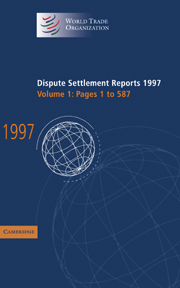Book contents
- Frontmatter
- Contents
- Japan – Taxes on Alcoholic Beverages, complaints by the European Communities (WT/DS8), Canada (WT/DS10) and the United States (WT/DS11) Award of the Arbitrator under Article 21.3(c) of the DSU
- United States - Restrictions on Imports of Cotton and Man-made Fibre Underwear, complaint by Costa Rica (WT/DS24): Report of the Appellate Body
- United States - Restrictions on Imports of Cotton and Man-made Fibre Underwear, complaint by Costa Rica (WT/DS24): Report of the Panel
- Brazil - Measures Affecting Desiccated Coconut, complaint by the Philippines (WT/DS22): Report of the Appellate Body
- Brazil - Measures Affecting Desiccated Coconut, complaint by the Philippines (WT/DS22): Report of the Panel
- United States - Measure Affecting Imports of Woven Wool Shirts and Blouses from India, complaint by India (WT/DS33): Report of the Appellate Body
- United States - Measure Affecting Imports of Woven Wool Shirts and Blouses from India, complaint by India (WT/DS33): Report of the Panel
- Canada - Certain Measures Concerning Periodicals, complaint by the United States (WT/DS31): Report of the Appellate Body
- Canada - Certain Measures Concerning Periodicals, complaint by the United States (WT/DS31): Report of the Panel
Japan – Taxes on Alcoholic Beverages, complaints by the European Communities (WT/DS8), Canada (WT/DS10) and the United States (WT/DS11) Award of the Arbitrator under Article 21.3(c) of the DSU
Published online by Cambridge University Press: 22 December 2017
- Frontmatter
- Contents
- Japan – Taxes on Alcoholic Beverages, complaints by the European Communities (WT/DS8), Canada (WT/DS10) and the United States (WT/DS11) Award of the Arbitrator under Article 21.3(c) of the DSU
- United States - Restrictions on Imports of Cotton and Man-made Fibre Underwear, complaint by Costa Rica (WT/DS24): Report of the Appellate Body
- United States - Restrictions on Imports of Cotton and Man-made Fibre Underwear, complaint by Costa Rica (WT/DS24): Report of the Panel
- Brazil - Measures Affecting Desiccated Coconut, complaint by the Philippines (WT/DS22): Report of the Appellate Body
- Brazil - Measures Affecting Desiccated Coconut, complaint by the Philippines (WT/DS22): Report of the Panel
- United States - Measure Affecting Imports of Woven Wool Shirts and Blouses from India, complaint by India (WT/DS33): Report of the Appellate Body
- United States - Measure Affecting Imports of Woven Wool Shirts and Blouses from India, complaint by India (WT/DS33): Report of the Panel
- Canada - Certain Measures Concerning Periodicals, complaint by the United States (WT/DS31): Report of the Appellate Body
- Canada - Certain Measures Concerning Periodicals, complaint by the United States (WT/DS31): Report of the Panel
Summary
INTRODUCTION
On 1 November 1996, the Dispute Settlement Body (the “DSB”) adopted (WT/DSB/M/25) the Appellate Body Report and the Panel Report, as modified by the Appellate Body Report, in Japan - Taxes on Alcoholic Beverages (WT/DS8/11, WT/DS10/11 and WT/DS11/8). As required by Article 21(3) of the Understanding on Rules and Procedures Governing the Settlement of Disputes (the “DSU”), Japan informed the DSB on 20 November 1996 of its intentions in respect of the implementation of the DSB's recommendations and rulings (WT/DSB/M/26). Japan indicated that it would not be able to implement immediately but only within a “reasonable period of time”. Japan did not propose to the DSB a “reasonable period of time” for the latter's approval as provided for under Article 21(3)(a) of the DSU. It indicated that it would initiate negotiations with the European Communities, the United States and Canada, the other parties to the dispute, on what constitutes “a reasonable period of time”. These negotiations did not succeed, and no mutual agreement within the meaning of Article 21(3)(b) of the DSU was reached. The negotiations with the European Communities did, however, lead to an agreement on an accelerated reduction of the tariff rates on whisky and brandy as compensation for delayed implementation, but this agreement does not prejudge their position on the issue of a “reasonable period of time”.
In the absence of an agreement under Article 21(3)(b) of the DSU, the United States requested on 24 December 1996, that the “reasonable period of time” should be determined through binding arbitration as is provided for by Article 21(3)(c). After Japan and the United States failed to agree on the appointment of an arbitrator within the ten days envisaged by the note to Article 21(3)(c), the United States requested on 7 January 1997 that the Director-General appoint an arbitrator. Following consultations with the United States and Japan, the Director-General appointed me as arbitrator on 17 January 1997.
At an organizational meeting on 20 January 1997, it was agreed that all the original parties to the dispute could participate in the arbitration process, notwithstanding that only the United States had requested binding arbitration.
- Type
- Chapter
- Information
- Dispute Settlement Reports 1997 , pp. 3 - 10Publisher: Cambridge University PressPrint publication year: 2000

